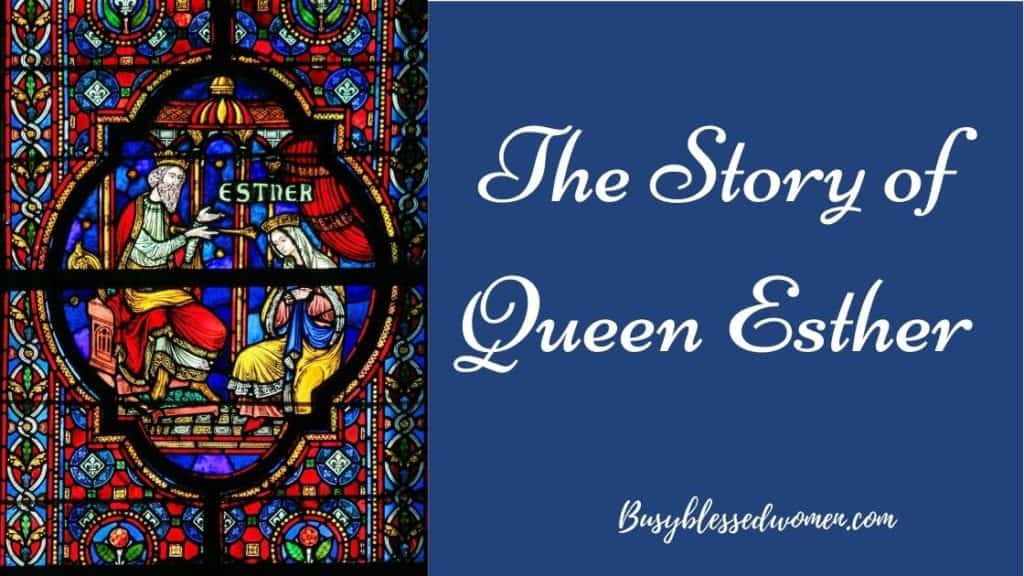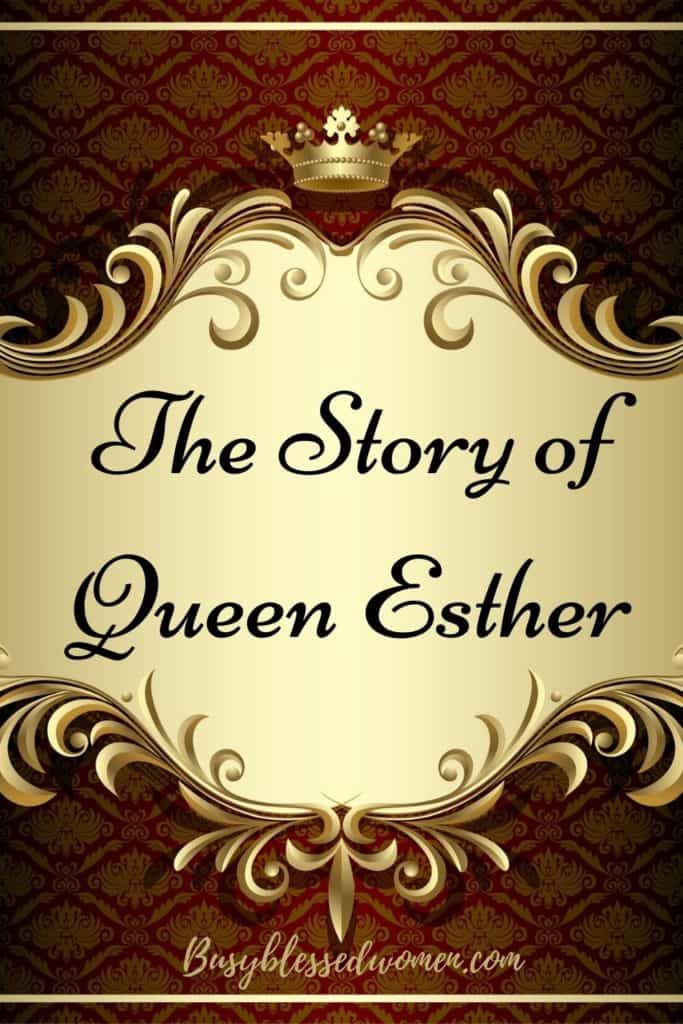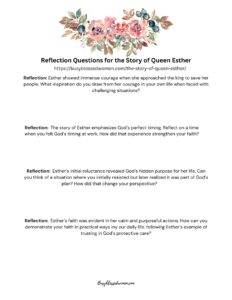The Bible is full of encouraging stories about the lives of women, which is quite amazing considering their second-class status of their day. One of the more intriguing stories is that of Esther. What made Esther so special? The book of Esther is one of only two books in the Bible named for women!

Facts about Queen Esther
Esther didn’t start out as Queen, but God placed her in that situation to carry out His sovereign plans.
Where did Esther Live?
Esther was living in exile in Persia, as were many Jews scattered throughout this vast empire. By decree, they had given the Jews permission to return to Jerusalem. But Esther’s parents were among those who opted to stay. She lived in Susa, the capital city of Persia.
Esther Family Tree
Esther’s father’s name was Abihail and her parents named her Hadassah at birth- (it was a common practice of the Jews to have double names).¹ Her parents both died at some point, and Esther’s cousin Mordecai adopted and raised her.
“Mordecai had a cousin named Hadassah, whom he had brought up because she had neither father nor mother…. And Mordecai had taken her as his own daughter when her father and mother died.” Esther 2:7 NIV.
Losing her parents at a young age must have been very difficult for Esther. It is one of the many times we see how God worked behind the scenes to provide for her and her people.
History of Esther
Esther’s rise to Queen begins with the Persian King Xerxes’ problems with his present Queen, Vashti. We read about a banquet held in the king’s palace for Xerxes to show off his wealth and majesty.
“At the time King Xerxes reigned from his royal throne in the citadel of Susa, and in the third year of his reign he gave a banquet for all his nobles and officials… For a full 180 days he displayed the vast wealth of his kingdom and the splendor and glory of his majesty.” Esther1:2-4.
This sumptuous banquet was followed by yet another great banquet where the “royal wine was abundant” (1:7) and free flowing. (He was preparing to invade Greece and needed to flex some muscle/show off…)
Queen Vashti, meanwhile, was holding her own banquet for the women of the palace. On the seventh day, the King was “in high spirits from the wine.” Xerxes instructs the king’s eunuch to bring the Queen to him so he could flaunt her beauty to all.
But Queen Vashti refused- it went against Persian custom for women to appear before a public gathering of men.
Fearing the fallout from his wife’s refusal, the King huddled with his advisors. Queen Vashti’s actions, they impulsively decided, would cause other women to act in the same way.
“There will be no end of disrespect and discord.” (1:18b) So a royal decree went out declaring a new law- every man would be ruler of his own house and included a provision for the removal of Vashti.
The search was on for a new Queen. The king’s advisers proposed to round up beautiful young virgins from throughout the kingdom. They would bring them to the palace and spruce them up with 12 months of beauty treatments.
They took many young women (who had no choice), including Esther, described as “lovely in form and features.” (2:7) She immediately became a favorite, received special food, seven maids to attend to her, and moved “into the best place in the harem.” (2:9)
Esther hid her Jewish background because her cousin Mordecai feared for her safety and forbid her to reveal it. He worried about her terribly, walking back and forth every day near the courtyard of the harem to discover how Esther was faring.
How Did Esther Become Queen?
They took each girl into the king’s presence at night, and in the morning, she would return to the king’s harem. She would then become his concubine, whose sole purpose was to entertain the king at his whim.
Esther’s turn came, and they took her to the king.
He was “attracted to Esther more than to any of the other women, and she won his favor and approval more than any of the other virgins. So he set a royal crown on her head and made her Queen” of Persia. (2:17)
Meanwhile, Mordecai sat daily at the king’s gate as his job of government official, associating with other men of influence. He overhears a plot to assassinate the king and tells Queen Esther.
She reports it to the king, giving Mordecai all the credit. The proper authorities recorded his good deed in the king’s presence, but Mordecai received no reward or acclaim.
Again, we see God working behind the scenes- to place Mordecai where he can overhear the plot, and the forgetfulness of the king to reward him.
Mordecai and Haman
At some point in Queen Esther’s reign, the king elevates a man named Haman to be his advisor/prime minister.
“The king took his signet ring from his finger and gave it to Haman, son of Hammedatha,” an enemy of the Jews. 3:1
“All the royal officials at the king’s gate knelt down and paid honor to Haman, for the king had commanded this concerning him.” 3:2
So when Mordecai obeyed God and refused to kneel before Haman and pay him honor, it enraged Haman. He had learned Mordecai was a Jew (the reason he wouldn’t bow to him), and plotted to annihilate them all.
He “cast the pur, (that is, the lot)” to select a day and month to destroy the Jews. 3:7.
Mordecai’s faithfulness to God came at a price.
Haman went to the king with a purposely vague description of a scattered people in his kingdom that disobeyed his laws. He talked the king into issuing a decree to destroy and kill them all, taking their possessions as their own on the specific day they chose (almost a year later.)
The king didn’t know that he had just signed a death warrant for his beloved Queen Esther.
Mordecai and Esther
When Mordecai learns of Haman’s plot, he instructs one of the king’s servants to explain the situation to Esther. He asks her to go before the king and “beg for mercy and plead with him for her people.” (4:8b)
Unfortunately, this could have been a death sentence for Esther. She sends a message back to Mordecai saying everyone knew that “for any man or woman who approaches the king in the inner court without being summoned the king has but one law; that he be put to death. ” (4:11)
The only way out was to hope the king was feeling especially benevolent and to spare their life by extending his gold scepter for them to touch.
Mordecai sent back his answer to Esther:
“Do not think that because you are in the king’s house you alone of all the Jews will escape. For if you remain silent at this time, relief and deliverance for the Jews will arise from another place, but you and your father’s family will perish. And who knows but that you have come to royal position for such a time as this?” vv13-14.
Mordecai reminds Esther that God had placed her in a leadership position for a reason. She needed the courage to see it as well, and to act.

For Such a Time as This
Mordecai reminded Esther that he expected God to deliver His people through her station in life and actions.
Yes, He could do it through someone else, but Esther needed to trust God.
Are we not put in similar positions? God has placed us in this world, with gifts, talents, and opportunities, to lead His lost ones to Him. Will we shrink back in fear, or go forward in faith?
“Then Esther sent this reply to Mordecai: ‘Go, gather together all the Jews who are in Susa, and fast for me. Do not eat or drink for three days night or day. I and my maids will fast as you do. When this is done, I will go to the king, even though it is against law. And if I perish, I perish.” 4:15-16.
In faith, Esther risks her life in submission to God. She courageously put the lives of others before her own.
In the Old Testament, prayer always accompanies fasting. Esther was depending on God’s help in her dangerous mission.
Where do you seek help and wisdom in times of need? We tend to “lean on our own understanding”, or go to friends and family first. Esther shows us a better way- diligent prayer accompanied by many prayer partners!
In this time of intense prayer and fasting, God reveals a plan to Esther.
So on the third day, Esther put on her royal robes and went into the presence of the king. When he saw her, he was pleased and held out his scepter to her.
He invited her to ask for anything, even up to half the kingdom! But Esther began her planned intercession by asking the king and Haman to a banquet, on that day and the next.
Esther’s Banquet
On the night before Esther’s banquet, the king had insomnia, so he ordered the book containing the record of his reign to be read to him. He heard of Mordecai’s uncovering of the assassination plot against him.
“What honor and recognition has Mordecai received for this? the king asked. Nothing has been done for him, his attendants answered.” 6:3.
Upon discovery of the oversight, the king honored Mordecai the next day.
God’s perfect timing reveals to the king the previously unrecognized life-saving actions of Mordecai- on the very day Esther would plead for her people’s lives!
What did Esther reveal at the banquet?
At the second banquet, the king asked Esther to reveal her request.
“If I have found favor with you, O king, and if it pleases your majesty, grant me my life- this is my petition. And spare my people- this is my request. For I and my people have been sold for destruction and slaughter and annihilation. If we had merely been sold as male and female slaves, I would have kept quiet, because no such distress would justify disturbing the king.”
The enraged king asked her, “Who is he? Where is the man who has dared to do such a thing?” (7:5)
Esther names Haman as the perpetrator. The king sentences Haman to death, and because of Mordecai’s recent recognition, the king named him to take over Haman’s position. The king revises his previous edict of destruction of the Jews, allowing them to defend themselves against those who would try to destroy them.
Esther and Purim
Mordecai documented all the events that happened and encouraged an annual holiday to be held. It would forever commemorate this time when God saved them from their enemies and turned their sorrow into joy.
The story of Esther is the origin of the feast of Purim, meaning “lots“- Haman cast lots to determine the day of the destruction of the Jews. It remains a feast still celebrated today on February 28th.
Lessons From Esther
•We see God working in Esther’s life even though His Name is not specifically found. Esther was a faithful Jewish woman who used her faith to bring her through the loss of her parents and her freedom in life.
We see how God can bring blessings into the direst circumstances. We truly worship the God of the Impossible!
•God used Esther, a female hero, to save the Jewish nation from destruction.
Esther set aside her own fear, and facing death, took action, believing in God’s sovereignty and control.
•We can lose our possessions and external beauty and experience broken relationships and heartache in this life.
The only true security we have rests on our faith in God and His unchanging nature. Then we, like Esther, can face any challenge this life offers.
The book of Esther contains even more intrigue, plots, and workings of God than I have covered here. I highly recommend reading its ten brief chapters this week to uncover even more lessons from her unusual circumstances and see how God’s sovereignty and care is worked out through her actions.
Blessings!
AnnMarie
All Scripture is taken from the NIV unless specified otherwise.
Would you like a printable page with the reflection questions from this post? Click on the image below to take you to the free pdf file and download.

¹https://www.encyclopedia.com/philosophy-and-religion/Bible/old-testament/esther
Photo Credit: Deposit Photos
